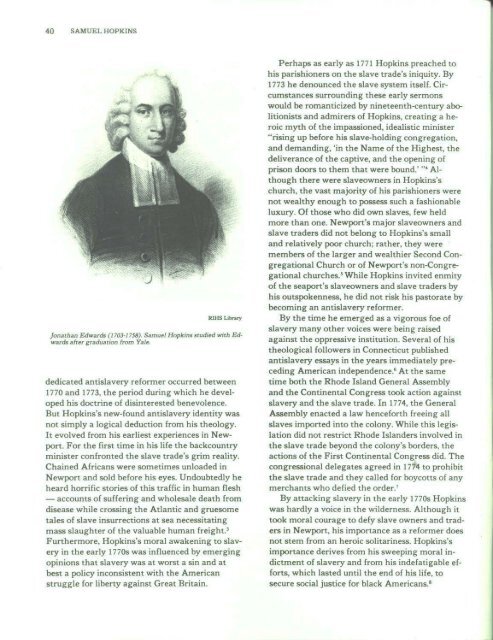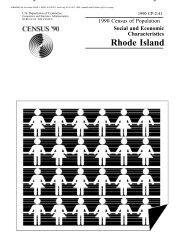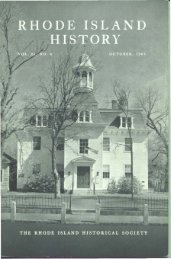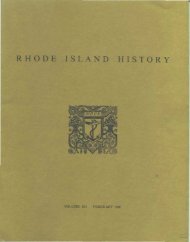RHODE ISLAND HISTORY - Rhode Island Historical Society
RHODE ISLAND HISTORY - Rhode Island Historical Society
RHODE ISLAND HISTORY - Rhode Island Historical Society
- No tags were found...
You also want an ePaper? Increase the reach of your titles
YUMPU automatically turns print PDFs into web optimized ePapers that Google loves.
40 SAMUEL HOPKINSRlHS LibraryJomthUl Edwll~ (l7OJ-/758). Sllmu~1 Hopkin• • fudi~ wifh EdWll~ Ilh~r gr.odu.Ofion from y..l~,dedicated antislavery reformer occu rred between1770 and 1773, the period during which he developedhis doctrine of disinterested benevolence.But Hopkins's new-found antislavery identity wasnot simply a logical deduction from his theology.It evolved from his earliest experiences in Newport.For the first time in his life the backcountryminister con fro nted the slave trade's grim reality.Ch ained Africans were sometimes unloaded inNewport and sold before his eyes. Undoubtedly heheard horrific stories of this traffic in human flesh- accounts of suffering and wholesale death fromdisease while crossin g the Atlantic and gruesometales of slave insurrections at sea necessitatingmass slaughter of the valuable human freight.'Furthermore. Hopkins's moral awakening to slaveryin the early 1770s was influenced by emergingopinions that slavery was at worst a sin and atbest a policy inconsistent with the Americanstruggle for liberty against Great Britain.Perhaps as early as 1771 Hopkins preached tohis parishioners on the slave trade's iniquity. By1773 he denounced the slave system itself. Circumstancessurrounding these early sermonswould be romanticized by nineteenth-eentury abolitionistsand admirers of Hopkins, creatin g a heroicmyth of the impassioned, idealistic minister"rising up before his slave-holding congregation,and demanding, 'in the Name of the Highest, thedeliverance of the captive, and the opening ofprison doors to them that were bound.' " 4 Althoughthere were slaveowners in Hopkins'schurch, the vast majority of his parishioners werenot wealthy enough to possess such a fashionableluxury. Of those who did own sla ves, few heldmore than one. Newport's major slaveowners andslave traders did not belong to Hopkins's smalland relatively poor church; rather, they weremembers of the larger and wealthier Second CongregationalChurch or of Newport's non-Congregationalchurches.J While Hopkins invited enmityof the seaport's slaveowners and slave traders byhis outspokenness, he did not risk his pastorate bybecoming an antislavery reformer.By the time he emerged as a vigorous foe ofslavery many other voices were being raisedagainst the oppressive institution. Several of histheological followers in Connecticut publishedantislavery essays in the years immediately precedingAmerican independence." At the sametime both the <strong>Rhode</strong> <strong>Island</strong> General Assemblyand the Continental Congress took action againstslavery and the slave trade. In 1774, the GeneralAssembly enacted a law henceforth freeing allslaves imported into the colony. While this legislationdid not restrict <strong>Rhode</strong> <strong>Island</strong>ers involved inthe slave trade beyond the colony's borders, theactions of the First Continental Congress did . Thecongressional delegates agreed in 1714 to prohibitthe slave trade and they called for boycotts of anymerchants who defied the order.'By attacking slavery in the early 1770s Hopkinswas hardly a voice in the wilderness. Although ittook moral courage to defy slave owners and tradersin Newport, his importance as a reformer doesnot stem from an heroic solitariness. Hopkins'simportance derives from his sweeping moral indictmentof slavery and from his indefatigable efforts,which lasted until the end of his life, tosecure social justice for black Americana-











